Management Information Systems
Summer Course 97 - Timisoara
Este curso de verão foi leccionado em Timisoara (Roménia), na Universidade Politécnica entre os dias 17 e 31 de Agosto de 1997 no âmbito do BEST. Os pontos seguintes descrevem sucintamente como foi este curso.
Timisoara é uma das maiores cidades Romenas situada a oeste com cerca de 400.000 habitantes. Atendendo a documentos datados de 1212, a cidade tem vindo a preservar parte da sua antiga fortaleza e do seu castelo (ambos do séc. XIV). No séc. XIX novos desenvolvimentos aconteceram. Timisoara foi a primeira vila europeia a usar luz eléctrica nas ruas (1884) . Dados recentes indicam que Timisoara é dos maiores centros económico, científico e cultural nesta parte da Transilvania . Em Dezembro de 1989, foi aqui que começou a revolução com o espírito de liberdade e democracia.
Ao longo deste curso estavam programadas aulas durante as manhãs e as tardes de cada dia (algumas aulas de tarde em laboratório) e algumas visitas a companhias estabelecidas na cidade. Durante as aulas falámos essencialmente de 3 questões, cada uma delas dada por um professor diferente: Marketing, Sistemas de Informação (SI) em geral e gestão de Recursos Humanos em trabalhos de grupo.
As aulas de marketing incidiram mais sobre marketing de produtos, conversámos acerca do que é 'bom' e 'mau' marketing, e a importância e impacto que este tem na imagem de uma organização. Fizémos um pequeno exercicio onde pudémos discutir sobre o que deve ser uma boa argumentação, neste caso, sobre venda de produtos. Em seguida falámos acerca de SI, onde se fez uma breve introdução ao assunto, na qual se tentou definir e perceber o conceito. Esboçou-se alguns esquemas sobre SI e conversámos acerca de um SI genérico para um tipo de organização genérico de produção industrial. Acerca de gestão de recursos humanos e de trabalho colectivo, aliás um tema dado de uma forma muito interessante, as aulas foram totalmente práticas. Desde o descobrir da nossa personalidade (através de um exercicio de sinceridade), passando por exercicios de psicologia de grupos até exercícios de trabalho em grupo, foi tudo muito interessante. As aulas de laboratório foram acerca de gestão de projectos. Testámos software específico para determinados projectos e através de uma ferramente de gestão de projectos fizémos o planeamento de um projecto imaginado por nós. No meu caso foi o ciclo de produção de vinho.
As visitas que se efectuaram às companhias (P&G, ABB e Alcatel) foram bastante interessantes. Aí tínhamos contacto com casos reais, onde pudémos conversar com os responsáveis das áreas a visitar e questioná-los sobre o funcionamento dos seus sectores e os respectivos fluxos de informação e sistemas que os gerem.
Estes cursos são também uma forma muito valiosa de intercâmbio cultural e social. Desde o facto de contactarmos com gente muito diversa, falando sempre em inglês e aprendendo algumas palavras de romeno no dia-a-dia e nas aulas, as interessantes conversas entre os colegas dos vários países - o contacto com os seus hábitos e o conhecer terras, ambientes e cheiros diferentes foram alguns dos muitos factores que tornam os SC importantes no enriquecimento cultural de cada pessoa. Nas aulas dadas pelos professores apenas um decidiu falar em inglês, apesar das dificuldades. Todas as noites existiam festas culturais (festival internacional de música, gastronómico, ...), e quando havia algum tempo livre durante o dia tínhamos visitas guiadas, ou não, à cidade.
| Functions
regarding the group tasks |
| Function of
maintaining the group |
| Individual tasks |
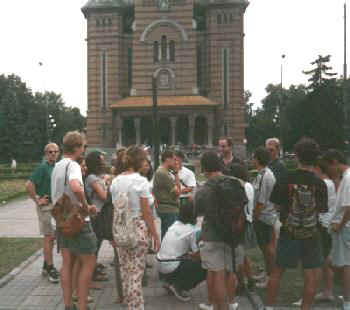
1. Here we are listening the guide. Peter is very regardful, and "terrone" (Ettore) very tired.
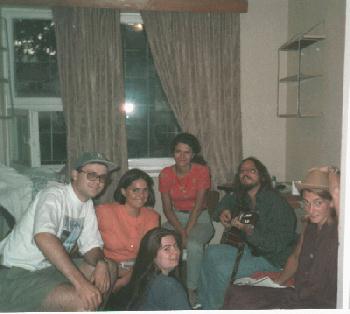
2. Sebastiano, his guitar and the singers.
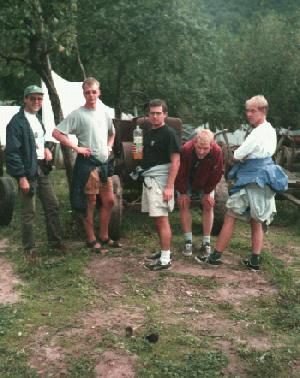
3. The swedish boys, me, and the 2 little chicks an the floor.
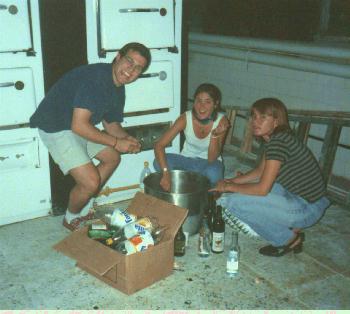
4. Ivan, Cris and Inês doing the 'sangria'.
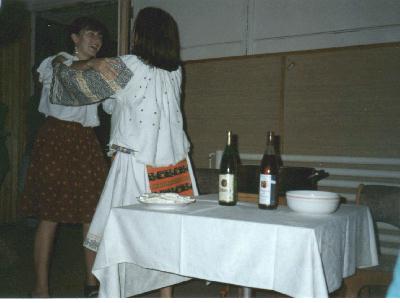
5. The Romanian folk dance and song before the eating part of the International Festival of food.
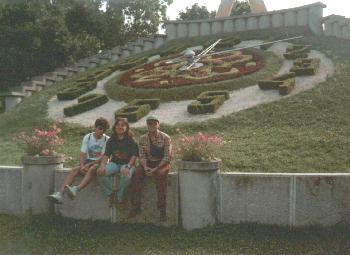
6. Erik, Imma and me on the clock.
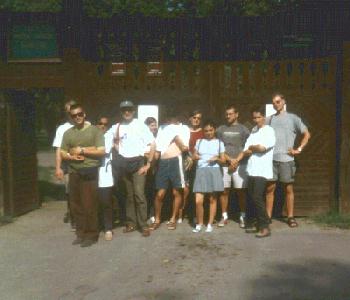
7. The visitants of the museum.
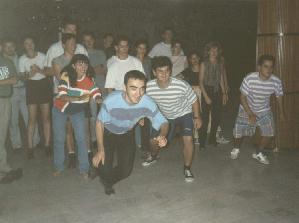
8. The game of the 'vodka around the vodka'.